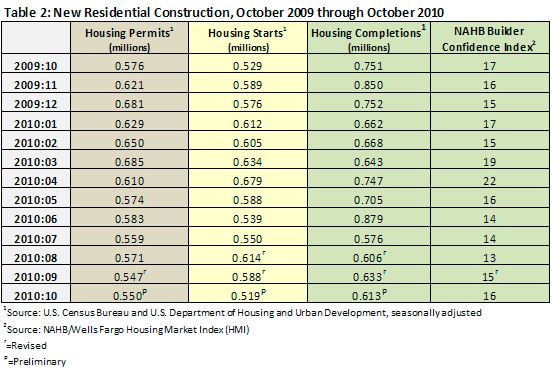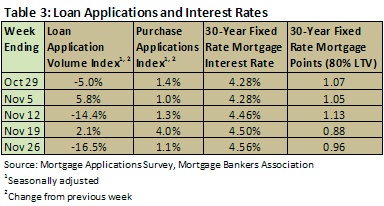
If slow and steady wins the recovery race, then the housing market has the slow part nailed. Unfortunately for the industry, the steady part needs some work. After a series of positive statistics in September, almost all housing numbers took a hammering in October. According to Charles Haldeman, Jr., chief executive of Freddie Mac, “We believe that it will be a considerable time until the housing market has a sustainable recovery.”
While sales of both new and existing homes declined in October, pending home sales data indicates sales may pick up in the next month or two. According to the National Association of Realtors, the Pending Home Sales Index (PHSI) rose by 10.4 percent in October. (The PHSI is a leading indicator; sales generally will show similar growth 1-2 months later.) "It is welcoming to see a solid double-digit percentage gain, but activity needs to improve further to reach healthy, sustainable levels. The housing market clearly is in a recovery phase and will be uneven at times, but the improving job market and consequential boost to household formation will help the recovery process going into 2011," said Lawrence Yun, the association's chief economist.
Considering economists were estimating the number to decline by 0.5 percent, analysts scrambled to explain the unexpected jump. Jennifer Lee, senior economist for BMO Capital Markets, said, “…September’s decline may be due to all of the uncertainty over the foreclosure documentation issue, with the point being … who would put in a bid on a potentially foreclosed home when you don’t know if it was legally foreclosed or not.” With the moratorium taking those properties with potential problems off the market, the properties that were left would have been seen as safe investments.
The moratorium Lee refers to was put in place last month by several mortgage companies after document handling issues led to investigations by all 50 state Attorney Generals. Fannie Mae and Freddie Mac were two of the firms that suspended some foreclosure activities while those cases were investigated. After almost a month, Fannie and Freddie both sent out memos to the realtors handling the sales of their properties to resume sales activities. Their interest in resuming sales on these properties stems from the fact that together they own 240,000 reclaimed properties worth over $24 billion. Freddie did have some good news from 3Q2010. It lost only $2.5 billion as opposed to the $5.4 billion it lost in 3Q2009.
October saw an increase in both personal spending and income, and claims for weekly unemployment benefits were the lowest in two years. In spite of these gains, the depressed housing market is keeping many from relocating for better, higher-paying jobs. This reluctance to move is mostly fueled by either an inability to sell current homes or the drastic cut in equity many would have to take if they sold at this time. A study by Worldwide ERC, a trade group, found that 75 percent of employers are encountering strong reluctance among their employees to relocate.
As mentioned before, industry statistics across the board took a hit in October. Existing home sales dropped by 100,000 or 2.3 percent from the previous month. Median sales price fell 0.6 percent, from $171,500 to $170,500. New home sales experienced a softer decline of only 8.8 percent; median sales price fell 16.1 percent, from $226,300 to 194,900. Existing home inventory dropped slightly to 10.5 months, but new home inventory increased from 7.9 to 8.6 months.
To keep everything in perspective, Lawrence Yun, National Association of Realtors (NAR) chief economist, said, "The housing market is experiencing an uneven recovery. Based on current and improving job market conditions, and from attractive affordability conditions, sales [of existing homes] should steadily improve to healthier levels of above 5 million by spring of next year."

Housing starts and completions dropped 13.3 percent and 3.3 percent respectively. Housing permits and builder confidence were the only two positive numbers with permits increasing by 0.6 percent and the NAHB/HMI Builder Confidence Index increasing one point to 16. Despite the increase in number of permits, the National Association of Home Builders (NAHB) reports that permits are at their lowest levels since WWII, and when the economy is fully recovered, there will be a scramble to catch up with demand for new homes.

In November, loan application volumes declined by 23 percent. At the same time, 30-year fixed rate mortgage interest rates increased by 0.28 percent. This could negatively affect housing numbers going forward by decreasing the affordability factor that is offsetting some of the hesitation within the market.



 Suz-Anne Kinney
Suz-Anne Kinney


